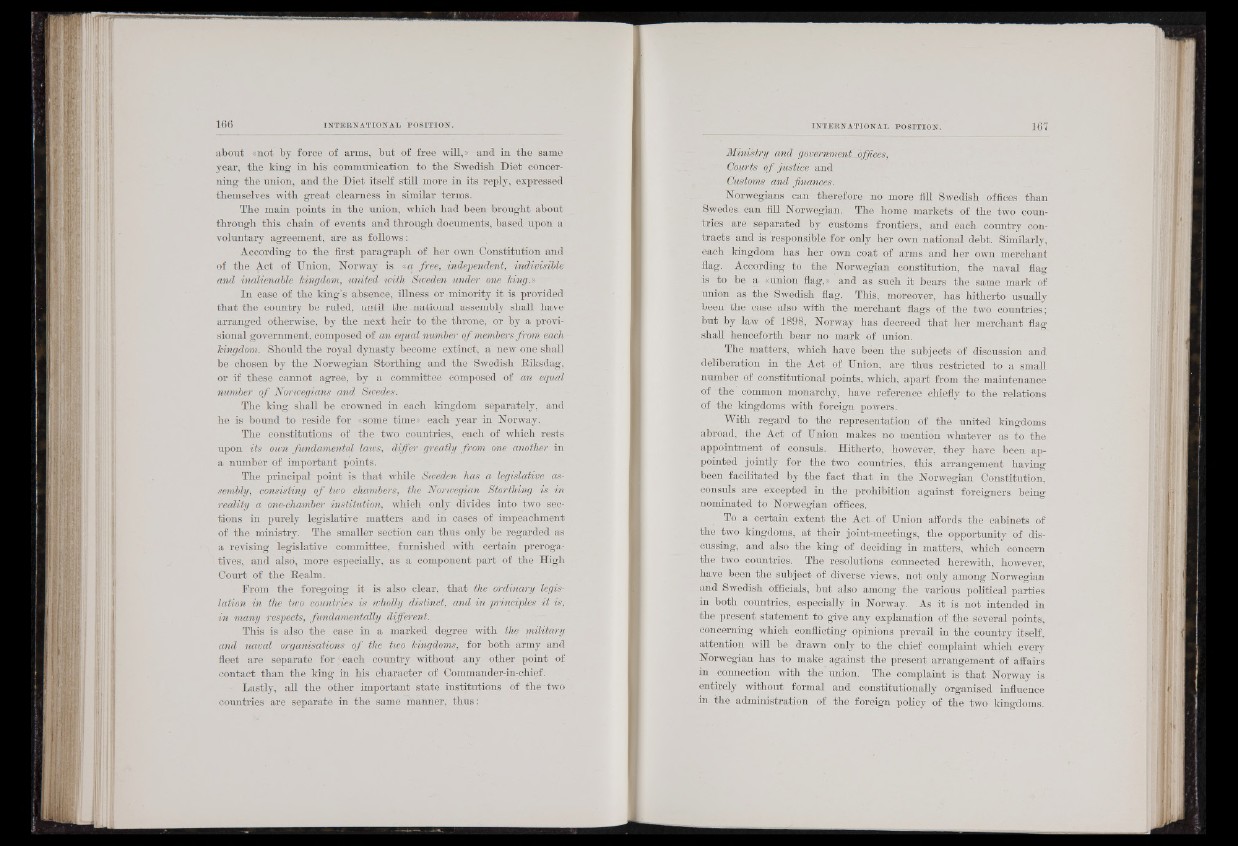
about «not by force of arms, but of free will,»' and in the same
year, the king in his communication to the Swedish Diet concerning
the union, and the Diet itself still more in its reply, expressed
themselves with great clearness in similar terms.
The main points in the union, which had been brought about
through this chain of events and through documents, based upon a
voluntary agreement, Eire as follows:
According to the first paragraph of her own Constitution and
of the Act of Union, Norway is. «a free, independent, indivisible
and inalienable kingdom, united with Sweden under one king.»
In case of the king’s absence, illness or minority it is provided
that the country be ruled, until the national assembly shall have
arranged otherwise, by the next heir to the throne, or by a provisional
government, composed of an equal number of members from eaeh
kingdom. Should the royal dynasty become extinct, a new one shall
be chosen by the Norwegian Storthing and the Swedish Riksdag,
or if these cannot agree, by a committee composed of an equal
number of Norwegians and Swedes.
The king shall be crowned in each kingdom separately, and
he is bound to reside for «some time» each year in Norway.
The constitutions of the two countries,, each of which rests
upon its own fundamental laws, differ - greatly^ from one another in
a number of important points.
The principal point is that while Sweden has a legislative assembly,
consisting of two chambers, the Norwegian Storthing is in
reality a one-chamber institution, which only divides into two sections
in purely legislative matters and in cases of impeachment
of the ministry. The smaller section can thus only be regarded as
a revising legislative committee, furnished with certain prerogatives,
and also, more especially, as a component part of the High
Court of the Realm.
From the foregoing it is also clear, that the ordinary legislation
in the two countries is wholly distinct, and in principles*'it is,
in many respects, fundamentally different.
This is also the case in a marked degree with the military
and naval organisations o f the two kingdoms, for both army and
fleet are separate for each country without any other point of
contact than the king in his character of Commander-in-chief.
Lastly, all the other important state institutions of the two
countries are separate in the same manner, thus:
Ministry and government .offices,
Goyrts of justice and
Customs and finances.
Norwegians can therefore no more fill Swedish offices than
Swedes can fill Norwegian. The home markets of the two countries
are separated by customs frontiers, and each country contracts
and is responsible for only her own national debt. Similarly,
each kingdom has her own coat of arms and her own merchant
flag. According to the Norwegian constitution, the naval flag
is to be «union flag,A and as such it bears the same mark of
union as the Swedish flag. This, moreover, has hitherto usually
been the case also with the merchant flags of the two countries ;
but by law of 1898, Norway has decreed that her merchant flag
shall henceforth bear no mark of union.
The matters, which have been the subjects of disoussion and
deliberation in the Act of Union, are thus restricted to a small
number of constitutional points, which, apart from the maintenance
of the common monarchy, have reference chiefly to the relations
of the kingdoms with foreign powers.
With regard to the representation of the united kingdoms
abroad, the Act of Union makes no mention whatever as to the
appointment of consuls. Hitherto, however, they have been appointed
jointly for the two countries, this arrangement having
been facilitated by the fact that in the Norwegian Constitution,
consuls are excepted in the prohibition against foreigners being
nominated to Norwegian offices.
To a certain extent the Act of Union affords the cabinets of
the two kingdoms, at their joint-meetings, the opportunity of discussing,
and also the king of deciding in matters, which concern
the two countries. The resolutions connected herewith, however,
have been the subject of diverse views, not only among Norwegian
and Swedish officials, but also among the various political parties
in both countries, especially in Norway. As it is not intended in
the present statement to give any explanation of the several points,
concerning which conflicting opinions prevail in the country itself,
attention will be drawn only to the chief complaint which every
Norwegian has to make against the present arrangement of affairs
in connection with the union. The complaint is that Norway is
entirely without formal and constitutionally organised influence
in the administration of the foreign policy of the two kingdoms.